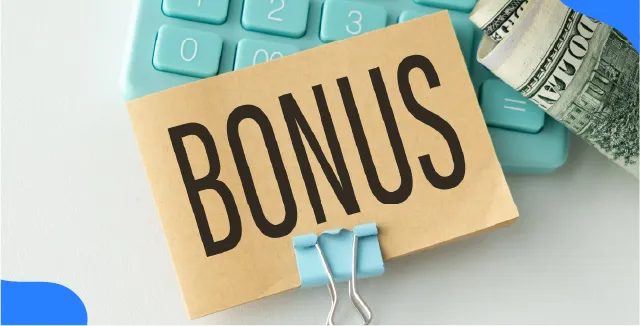What is Bonus Share? Meaning, Benefits & How It Works

Check Your Loan Eligibility Now
By continuing, you agree to LoansJagat's Credit Report Terms of Use, Terms and Conditions, Privacy Policy, and authorize contact via Call, SMS, Email, or WhatsApp
A bonus share is a free additional share that a company gives to its existing shareholders. Companies issue bonus shares instead of paying cash dividends when they have good profits but want to reinvest money into the business.
Ravi owns 2,000 shares of a company. The company decides to issue bonus shares in the ratio of 1:2, which means Ravi will receive 1 bonus share for every 2 shares he holds.
So, Ravi will receive 1,000 bonus shares as a reward for being a shareholder.
Understanding Record Date and Ex-Date for Bonus Shares
To receive bonus shares from a company, shareholders must own the shares before the ex-date. If someone buys the shares on or after the ex-date, they will not receive the bonus shares, as the ownership does not transfer in time.
India follows the T+2 rolling settlement system, which means the record date comes two working days after the ex-date. The record date is when the company finalises the list of shareholders eligible for the bonus issue.
Example: Riya's Eligibility for Bonus Shares
Riya planned to receive bonus shares from a company that announced an ex-date of 15th July and a record date of 17th July. She purchased shares on 14th July, which meant the shares were credited to her demat account by the record date.
Therefore, she was eligible to receive bonus shares. If Riya had bought the shares on 15th July (the ex-date), she would not have been eligible because the transfer of ownership would not have been completed in time.
Key Points to Remember
- Ex-Date: The last date to buy shares and remain eligible for bonus shares is one day before the ex-date.
- Record Date: This is the date on which the company checks its records to finalise eligible shareholders.
- T+2 Settlement: In India, shares are credited to the buyer’s demat account two working days after the trade.
- New ISIN: A new International Securities Identification Number (ISIN) is allotted for the bonus shares.
- Credit Timeline: Bonus shares are generally credited to your demat account within 15 days of the record date.
Advantages of Bonus Shares
Disadvantages of Bonus Shares
Types of Bonus Shares: Fully Paid and Partly Paid Explained
Companies may issue two types of bonus shares to their shareholders based on their capital structure: fully paid bonus shares and partly paid bonus shares. Let’s understand both with simple explanations and an example.
1. Fully Paid Bonus Shares
These are bonus shares that a company gives free of cost to its existing shareholders. The shares are fully paid, which means the investor does not need to pay anything for them.
Companies usually issue fully paid bonus shares in proportion to the investor’s current holdings. These shares come from specific reserves such as:
- Profit and loss account
- Capital reserves
- Capital redemption reserve
- Securities premium account
Example:
Amit holds 1,000 shares of a company. The company announces a 1:1 fully paid bonus issue. This means Amit will receive 1 bonus share for every 1 share he owns, so he will get 1,000 bonus shares completely free. His total shareholding will now be 2,000 fully paid shares.
2. Partly Paid-Up Bonus Shares
To understand this type, let’s first look at partly paid shares. These are shares where the investor has paid only part of the total issue price, and the rest is due later in instalments when the company makes a call.
A partly-paid bonus share is issued when:
- The company uses its profits to make these partly paid shares fully paid.
- Shareholders don’t have to pay the remaining amount.
- This is done by capitalising on profits.
- Unlike fully paid bonus shares, the company cannot use the capital redemption reserve or securities premium account for this issue.
Example:
Rohit owns 500 partly paid shares, where he has paid only ₹5 out of a ₹10 share price. The company decides to issue a bonus that covers the remaining ₹5 from its profits. Rohit’s shares are now fully paid, and he does not need to pay the rest.
Importance of Bonus Shares in the Stock Market
Bonus shares play a key role in the stock market. They not only reward existing shareholders but also help companies improve their market image.
Although the total investment value stays the same immediately after the issue, bonus shares bring long-term benefits for both investors and companies.
Example: How Bonus Shares Help
Let’s say Neha holds 1,000 shares of XYZ Ltd. at ₹200 per share. The company issues a 1:1 bonus, giving her 1,000 extra shares. The share price adjusts to ₹100, but Neha now holds 2,000 shares. Her total investment value remains ₹2,00,000, but her shareholding has doubled.
Key Benefits of Bonus Shares
- Bonus shares increase shareholding without any extra cost.
- They improve liquidity in the market, making shares easier to trade.
- They build investor confidence by showing strong company performance.
- They reduce earnings per share, which may attract more retail investors.
Before and After Bonus Share Issue
This shows how bonus shares maintain investment value while offering benefits like improved liquidity, better market image, and increased trust among investors.
Difference Between Bonus Shares and Stock Splits
People often confuse bonus shares with stock splits, but they are quite different. Both increase the number of shares held by investors, but the reasons behind them and how they affect the company’s accounts are not the same.
Conclusion
A bonus share is a free share given by a company to its existing shareholders. Companies issue bonus shares when they earn good profits but choose not to pay cash dividends. Bonus shares increase the number of shares held without affecting the total value of the investment. They help investors grow their shareholding and give companies a way to reward loyalty while keeping their cash reserves intact.
FAQ’s
1. What is a bonus share?
A bonus share is a free share that a company gives to its existing shareholders instead of paying a cash dividend.
2. Why do companies issue bonus shares?
Companies issue bonus shares to reward shareholders and use their profits without reducing cash reserves.
3. Do I need to pay for bonus shares?
No, you do not pay anything. Bonus shares are given free based on the number of shares you already hold.
4. Do bonus shares increase my total investment value?
No, the total value stays the same at first. You get more shares, but the share price adjusts.
5. Am I taxed for receiving bonus shares?
No, you do not pay tax when you receive bonus shares. Tax may apply only when you sell them later.
Other Informative Pages | |||
About the author

LoansJagat Team
Contributor‘Simplify Finance for Everyone.’ This is the common goal of our team, as we try to explain any topic with relatable examples. From personal to business finance, managing EMIs to becoming debt-free, we do extensive research on each and every parameter, so you don’t have to. Scroll up and have a look at what 15+ years of experience in the BFSI sector looks like.
Subscribe Now
Related Blog Post
Recent Blogs
Contents
Quick Apply Loan
Consolidate your debts into one easy EMI.
Takes less than 2 minutes. No paperwork.
10 Lakhs+
Trusted Customers
2000 Cr+
Loans Disbursed
4.7/5
Google Reviews
20+
Banks & NBFCs Offers
Other services mentioned in this article








